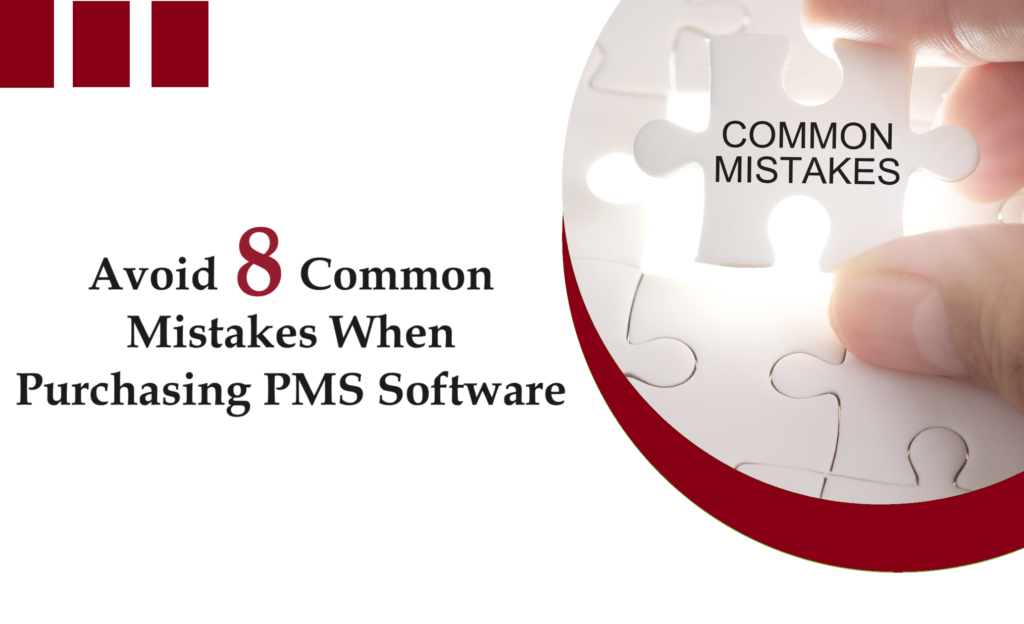
Selecting Property Management Software (PMS) is a critical decision for real estate businesses aiming to streamline operations and enhance efficiency. However, the process can be fraught with challenges if common pitfalls are overlooked. In this guide, we’ll explore essential strategies to avoid mistakes when purchasing PMS software.
1. Not Assessing Specific Needs and Requirements:
Before diving into the selection process, it’s crucial to assess your organization’s unique needs and requirements. Failure to do so may result in choosing a PMS solution that doesn’t align with your business objectives. Conduct a thorough analysis of your workflows, tenant management processes, accounting practices, and reporting needs to identify key functionalities required from the PMS software.
2. Overlooking Scalability and Flexibility:
Scalability is a vital consideration when selecting PMS software. Ignoring scalability can lead to limitations as your business grows, necessitating a costly transition to a new system. Ensure the chosen PMS software solution can accommodate increasing property portfolios, additional users, and evolving business requirements. Opt for a flexible and scalable software platform that can adapt to your organization’s changing needs over time.
3. Failing to Prioritize Integration Capabilities:
Integration capabilities are essential for seamless data flow and collaboration across different systems and departments within your organization. Overlooking integration capabilities can result in data silos and inefficiencies. Prioritize PMS solutions that offer robust integration with accounting software, CRM systems, maintenance management tools, and other relevant applications. Seamless integration enhances productivity, improves decision-making, and provides a holistic view of your property management operations.
4. Ignoring User Experience and Training Needs:
User experience plays a significant role in the successful adoption of PMS software. Neglecting to consider user experience can lead to low adoption rates and resistance from employees. Prioritize PMS solutions with intuitive interfaces, customizable dashboards, and user-friendly features. Additionally, invest in comprehensive training programs to ensure employees are proficient in using the software effectively. User-friendly software and adequate training contribute to increased productivity and satisfaction among your team members.
5. Underestimating Data Security and Compliance Requirements:
Data security and compliance are critical considerations when selecting PMS software, especially in the real estate industry, which deals with sensitive tenant and financial data. Underestimating data security and compliance requirements can expose your organization to data breaches, legal liabilities, and reputational damage. Choose PMS solutions that offer robust security features, such as encryption, access controls, and compliance with industry regulations like GDPR and HIPAA. Prioritize vendors with a proven track record in data security and regulatory compliance.
6. Rushing the Selection Process:
Selecting PMS software is a significant decision that requires careful consideration and evaluation. Rushing through the selection process can result in overlooking critical features, making hasty decisions, and choosing an inadequate solution. Take the time to thoroughly research and compare PMS vendors, schedule demos, and involve key stakeholders in the decision-making process. Consider the long-term implications of each PMS solution and choose the one that best meets your organization’s needs and objectives.
7. Neglecting Vendor Reputation and Support Services:
The reputation and reliability of the PMS vendor are essential factors to consider during the selection process. Neglecting to assess the vendor’s track record, customer reviews, and support services can lead to dissatisfaction and issues post-implementation. Choose reputable PMS vendors with a history of successful implementations and satisfied customers. Evaluate the vendor’s support services, including implementation assistance, training programs, and ongoing technical support, to ensure a smooth and successful transition.
8. Not Planning for Future Growth and Expansion:
Your organization’s growth trajectory should be a key consideration when selecting PMS software. Failing to plan for future growth and expansion can result in outgrowing the software’s capabilities, leading to the need for costly upgrades or migrations. Choose a PMS solution that can scale with your business future, accommodate additional properties and users, and adapt to evolving industry trends and technologies. Planning for future growth ensures that your investment in PMS software remains viable and sustainable over time.
Conclusion:
Avoiding common mistakes when purchasing PMS software is essential for maximizing the benefits and ROI of your investment. By assessing specific needs, prioritizing scalability and integration capabilities, focusing on user experience and data security, taking the time to research and evaluate vendors, and planning for future growth, you can select a PMS solution that aligns with your organization’s objectives and drives success in property management operations.
Remember to involve key stakeholders, conduct thorough due diligence, and prioritize long-term value when making your decision. With the right approach, you can avoid pitfalls and achieve optimal results with your chosen PMS software.





0 Comments